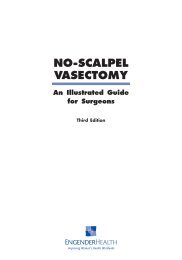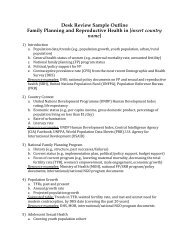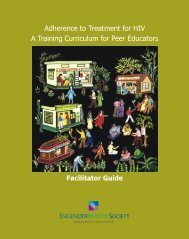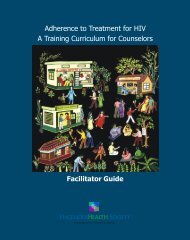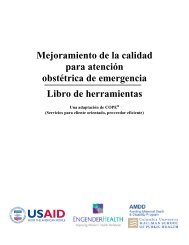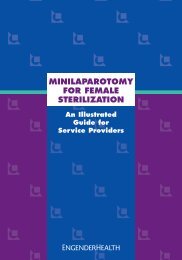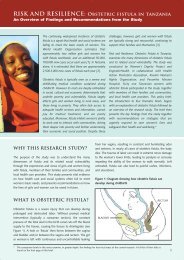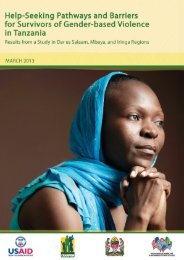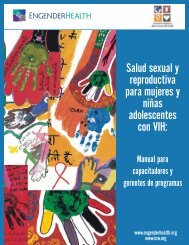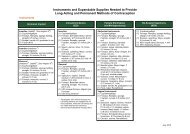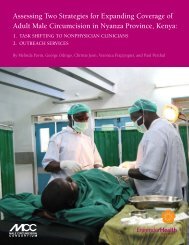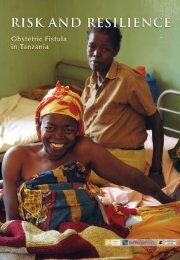COPE® FOR MALE CIRCUMCISION SERVICES - EngenderHealth
COPE® FOR MALE CIRCUMCISION SERVICES - EngenderHealth
COPE® FOR MALE CIRCUMCISION SERVICES - EngenderHealth
You also want an ePaper? Increase the reach of your titles
YUMPU automatically turns print PDFs into web optimized ePapers that Google loves.
COPE for Male Circumcision Services<br />
■ Action Plan. When COPE participants have completed the self-assessment, the client interviews,<br />
and the CFA (if performed), they convene at the Action Plan Meeting to discuss the<br />
site strengths, problems identified, and teams’ recommendations, and to prioritize the problems<br />
and consolidate the findings into a site Action Plan. By following the steps in recording<br />
their findings in the Action Plan, staff are able to develop clear problem statements,<br />
analyze the root causes of problems, develop solutions, identify staff members who will be<br />
responsible for organizing the implementation of the solution, and set a completion date for<br />
each recommendation. The staff also select the COPE (or QI) committee members and<br />
agree on the dates for the follow-up COPE exercise. A more detailed description of how to<br />
develop an Action Plan can be found in the COPE Handbook (p. 40).<br />
COPE Committee<br />
If no COPE or QI committee exists at the site, the staff should establish one. This committee<br />
ensures that the Action Plan is accessible to all staff, follows up on progress in implementing<br />
the COPE Action Plan, provides support to staff members responsible for implementation and<br />
to COPE facilitators (as needed or requested), schedules subsequent COPE exercises, informs<br />
staff about COPE activities (as needed or requested), and helps to monitor results and inform<br />
staff on the status of implementation. The committee members are selected (usually staff<br />
members volunteer) before the conclusion of the Action Plan Meeting.<br />
COPE Follow-Up<br />
Once the initial COPE exercise is completed, the facilitator and staff agree on a date for a<br />
follow-up exercise. At the follow-up exercise, the participants will reconvene and use the<br />
Action Plan Follow-Up Form to assess their progress in solving the problems in the Action<br />
Plan from the previous exercise. CFA may be conducted at the follow-up exercise, particularly<br />
if client waiting time or staff utilization were identified as a problem at the initial exercise. In<br />
addition, staff may wish to repeat one or more of the other tools during the follow-up<br />
exercise—for example, to use certain Self-Assessment Guides. It is not necessary to use all 10<br />
Self-Assessment Guides during the follow-up exercise, but staff should always conduct client<br />
interviews as part of all COPE exercises.<br />
COPE exercises should be conducted every three to six months to follow up on the previous<br />
site Action Plan and to identify new issues that need to be addressed. A more detailed<br />
description of COPE follow-up can be found in the COPE Handbook (p. 55).<br />
COPE for Male Circumcision Services<br />
The COPE tools for MC offer a structured approach for assessing the unique considerations<br />
inherent in the delivery of MC services, regardless of the service setting, whether the services<br />
are provided through a health facility or through mobile outreach teams. Men can be<br />
extremely sensitive to and wary of procedures that involve their genitals. MC can be<br />
culturally sensitive; for example, in some communities, MC is a rite of passage, usually from<br />
adolescence to young adulthood. MC can also be related to cultural identity (since some<br />
cultural groups traditionally circumcise and others do not). To ensure success, those who<br />
provide MC services must be extremely sensitive to clients’ rights and needs for informed<br />
decision making, confidentiality, privacy, and nonjudgmental counseling. Furthermore, health<br />
workers must have the proper training, support, and supplies to provide services (including<br />
prevention counseling and HIV testing) safely, in ways that make clients feel comfortable.<br />
10 <strong>EngenderHealth</strong>



